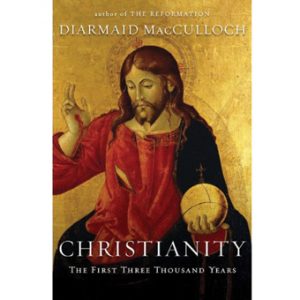 Christianity: The First Three Thousand Years
Christianity: The First Three Thousand Years
By Diarmaid MacCulloch (Viking, 2010)
Haters of history often ask the point of knowing names and dates, pointing out correctly that all of that information can now be found online. But Diarmaid MacCulloch offers a compelling counterpoint in his thousand-page summary of Christianity: More than names and dates, history is also a great story, one that gets even better in the quality of MacCulloch’s masterful telling.
A literal Oxford don and son of an Anglican clergyman, MacCulloch brings both the rigor of the academy and the reverence of a choirboy. Though he no longer describes himself as a believer, he sees his work as a “moral task,” arguing that history must “seek to promote sanity and to curb the rhetoric which breeds fanaticism.”
MacCulloch acknowledges that he offers a “personal view of the sweep of Christian history,” beginning not with Jesus of Nazareth but with ancient Greece and Rome and with Israel, without which Christianity cannot be understood.
MacCulloch tends to favor the forgotten and the underdog and to question any uniform claims to primacy or superiority in Christian tradition. Catholics, for example, should not expect MacCulloch to acknowledge Peter as the first “pope” as we understand that role today, but he doesn’t spend a lot of time debunking this or that theological claim of any Christian body either. As a historian, he is keenly aware—and makes his reader aware as well—of the interplay of politics and devotion, and he delicately pulls apart the strands of each without denying the influence of either one.
MacCulloch is the first to acknowledge the sheer size of the task he has chosen, and he helps the reader throughout with references to longer treatments of subjects in other parts of the book. His creative telling is augmented as well by three sections of color illustrations from Christian art. A six-part BBC documentary (Ambrose DVD) adds further life to MacCulloch’s story, one in which both history lovers and haters will likely find something to enjoy.
This article appeared in the August 2010 issue of U.S. Catholic (Vol. 75, No. 8, page 43).













Add comment